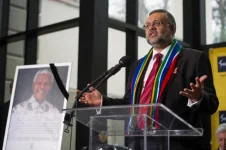President Trump kicked out South African Ambassador Ebrahim Rasool from the United States. Secretary of State Marco Rubio posted online Friday that Rasool wasn't "welcome in our great country" anymore. Rubio called him a "race-baiting politician who hates America and hates POTUS." He linked his message to a right-wing Breitbart article quoting Rasool, saying Trump used "supremacist instinct" and "white victimhood" as a "dog whistle" during the 2024 elections.
This expulsion adds to growing tensions between Trump's administration and South Africa. The African nation has backed Palestinian rights and led a case at the International Court of Justice claiming US ally Israel committed genocide in Gaza. Since Trump took office, Rasool hasn't received normal access to State Department officials or high-ranking Republicans, according to news outlet Semafor.
Rasool returned as South Africa's ambassador to America in January. He previously held this position from 2010 to 2015, when Barack Obama was president. South Africa's ruling party, the African National Congress, fought against apartheid and ended white minority rule there. Trump's team has repeatedly targeted the current government and supporters like billionaire Elon Musk, who comes from South Africa.
The administration claims South Africa discriminates against its white citizens. Trump cut off aid and offered fast-track citizenship for white Afrikaners allegedly "escaping government-sponsored race-based discrimination" in February. This happened when refugee admissions were almost completely stopped for people fleeing violence elsewhere. Trump acted because of a land distribution law meant to fix lingering apartheid inequalities.
South African officials say Trump misunderstands the law, which hasn't been used to take any land. President Cyril Ramaphosa's spokesperson Vincent Magwenya told Reuters they wouldn't engage in "counterproductive megaphone diplomacy" - referring to Trump's habit of posting about South Africa on social media. Despite Trump portraying white Afrikaners as victims, South African data shows apartheid's economic effects persist through massive inequality.
A 2017 government study found Black people make up 80 percent of South Africans but control just 4 percent of private farmland. White Afrikaners, only 8 percent of the population, possess most farmland. During apartheid, authorities forced Rasool and his family out of their Cape Town home. Black citizens faced relocation to non-white areas with almost no resources or economic chances.
This expulsion adds to growing tensions between Trump's administration and South Africa. The African nation has backed Palestinian rights and led a case at the International Court of Justice claiming US ally Israel committed genocide in Gaza. Since Trump took office, Rasool hasn't received normal access to State Department officials or high-ranking Republicans, according to news outlet Semafor.
Rasool returned as South Africa's ambassador to America in January. He previously held this position from 2010 to 2015, when Barack Obama was president. South Africa's ruling party, the African National Congress, fought against apartheid and ended white minority rule there. Trump's team has repeatedly targeted the current government and supporters like billionaire Elon Musk, who comes from South Africa.
The administration claims South Africa discriminates against its white citizens. Trump cut off aid and offered fast-track citizenship for white Afrikaners allegedly "escaping government-sponsored race-based discrimination" in February. This happened when refugee admissions were almost completely stopped for people fleeing violence elsewhere. Trump acted because of a land distribution law meant to fix lingering apartheid inequalities.
South African officials say Trump misunderstands the law, which hasn't been used to take any land. President Cyril Ramaphosa's spokesperson Vincent Magwenya told Reuters they wouldn't engage in "counterproductive megaphone diplomacy" - referring to Trump's habit of posting about South Africa on social media. Despite Trump portraying white Afrikaners as victims, South African data shows apartheid's economic effects persist through massive inequality.
A 2017 government study found Black people make up 80 percent of South Africans but control just 4 percent of private farmland. White Afrikaners, only 8 percent of the population, possess most farmland. During apartheid, authorities forced Rasool and his family out of their Cape Town home. Black citizens faced relocation to non-white areas with almost no resources or economic chances.












